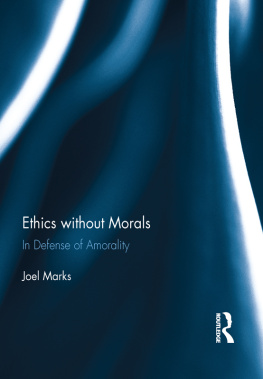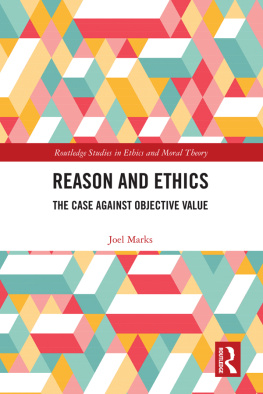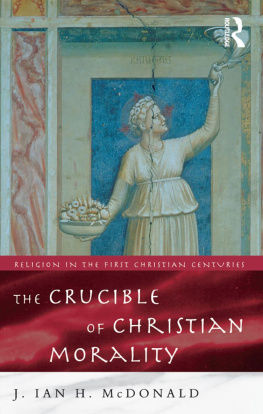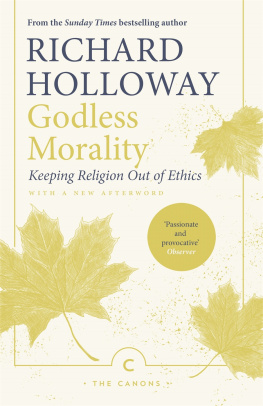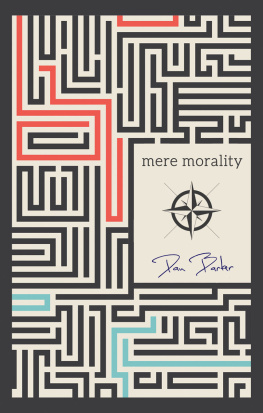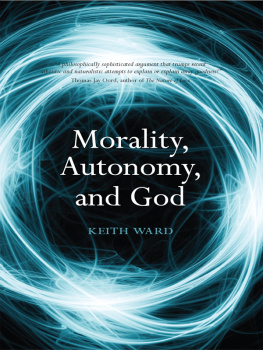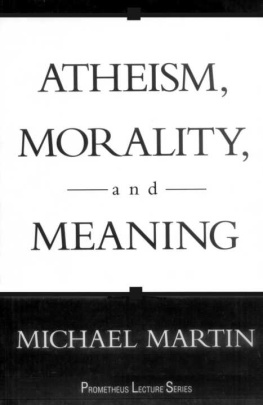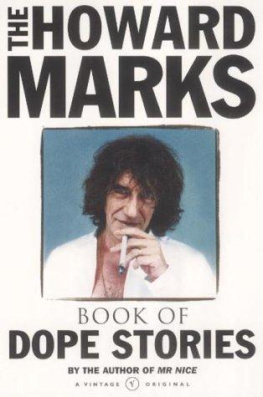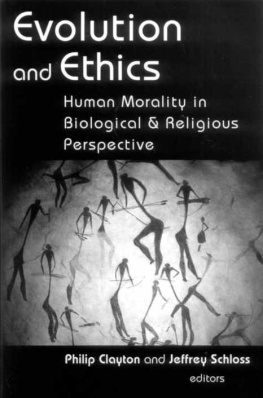Ethics without Morals
Routledge Studies in Ethics and Moral Theory
1 The Contradictions of Modern
Moral Philosophy
Ethics after Wittgenstein
Paul Johnston
2 Kant, Duty and Moral Worth
Philip Stratton-Lake
3 Justifying Emotions
Pride and Jealousy
Kristjn Kristjnsson
4 Classical Utilitarianism from Hume to Mill
Frederick Rosen
5 The Self, the Soul and the Psychology of Good and Evil
Ilham Dilman
6 Moral Responsibility
The Ways of Scepticism
Carlos J. Moya
7 The Ethics of Confucius and Aristotle
Mirrors of Virtue
Jiyuan Yu
8 Caste Wars
A Philosophy of Discrimination
David Edmonds
9 Deprivation and Freedom
A Philosophical Enquiry
Richard J. Hull
10 Needs and Moral Necessity
Soran Reader
11 Reasons, Patterns, and Cooperation
Christopher Woodard
12 Challenging Moral Particularism
Edited by Mark Norris Lance, Matja Potr, and Vojko Strahovnik
13 Rationality and Moral Theory
How Intimacy Generates Reasons
Diane Jeske
14 The Ethics of Forgiveness
A Collection of Essays
Christel Fricke
15 Moral Exemplars in the Analects
The Good Person is That
Amy Olberding
16 The Phenomenology of Moral Normativity
William H. Smith
17 The Second-Person Perspective in Aquinass Ethics
Virtues and Gifts
Andrew Pinsent
18 Social Humanism
A New Metaphysics
Brian Ellis
19 Ethics without Morals
In Defense of Amorality
Joel Marks
First published 2013
by Routledge
711 Third Avenue, New York, NY 10017
Simultaneously published in the UK
by Routledge
2 Park Square, Milton Park, Abingdon, Oxon, OX14 4RN
Routledge is an imprint of the Taylor & Francis Group, an informa business
2013 Taylor & Francis
The right of Joel Marks to be identified as author of this work has been asserted by him in accordance with sections 77 and 78 of the Copyright, Designs and Patents Act 1988.
All rights reserved. No part of this book may be reprinted or reproduced or utilised in any form or by any electronic, mechanical, or other means, now known or hereafter invented, including photocopying and recording, or in any information storage or retrieval system, without permission in writing from the publishers.
Trademark Notice: Product or corporate names may be trademarks or registered trademarks, and are used only for identification and explanation without intent to infringe.
Library of Congress Cataloging-in-Publication Data
Marks, Joel, 1949
Ethics without morals : in defence of amorality / by Joel Marks.
p. cm. (Routledge studies in ethics and moral theory ; 19)
Includes bibliographical references (p. ) and index.
1. Ethics. I. Title.
BJ1031.M3153 2012
170dc23
2012020547
ISBN: 978-0-415-63556-1 (hbk)
ISBN: 978-0-203-09307-8 (ebk)
Typeset in Sabon
by IBT Global.
To Jack Davis, Jerry Shaffer, and Joel Kupperman, my steadfast mentors from graduate school to retirement (mine!) and beyond.
Contents
Acknowledgments
How this book came to be is a story in itself, which in fact I have told (in part) in a memoir which preceded it. This has been a personal journey as well as a professional one, and in both respects, many other individuals have been integral to it. Therefore I will combine a brief recapitulation of what transpired with acknowledgments to many friends and colleagues.
As with any series of events, there have been some noteworthy coincidences. One is that the episode that precipitated all that has followed occurred on Christmas Day (of 2007). I call this a coincidence because I think on that day I heard the glad tidings of the end of moral guilt, which is the secular equivalent of sin. Another coincidence is that the episode took place in the home of Mitchell Silver, whose ideas in his 2006 book, A Plausible God, have contributed both causally and substantively to the central argument of the present book. I call this a coincidence because Mitchell was not even present, nor his ideas in mind, when the episode took place.
The person who was present along with me was H___, with whom I was having a conversation about God. This was not unusual for us, as H___ is a minister and I was an agnostic. But there is still more of coincidence, or perhaps now it tends to irony. For it was discussion with H___ that had inspired my previous monograph, which was a defense of morality; whereas the result of the later discussion was to be my counter-conversion to amorality.
(It was also ironicor maybe absurd, or simply funnythat the thoughts that came to me from that conversation were apparently due to my misunderstanding what H___ was telling me as she later explained to me I think! None of this bothers me in the least, as it fi ts quite well with my new view of life as largely governed by unseen causes. But I had already become sympathetic to the manner of accidental inspiration from hearing Sam Wheeler in a seminar when I was in graduate school wax breezily about his own inspiration for a particular thesis from having possibly misunderstood the ancient Greeks.)
What then happened during that epochal conversation? Without fi lling in the narrative, I will only say that I realized that morality is like God. This had a double ef ect on me. It made me more receptive to theism, as committing one to something less consequential than I had previously supposed; and this was a good thing for me to realize, I felt, because I could then be in better accord with H___. But it also produced a panic and disappointment in me as I suddenly saw morality in the same light, as also less consequential than I had previously supposed. For about morality I had never been agnostic but always a true believer.
Over the course of a year or two this original insight evolved and transformed. At first my world still contained both God and morality; it was only that their natures had changed. Specifi cally, they were both simply an interaction between some non-supernatural reality external to the individual and the emotional response of the individual. God was the universe responded to with awe; right and wrong were human actions responded to with approval or disapproval. But this implied that most theists and moralists were making a mistake, namely, to believe that God was a self-existing supernatural entity and right and wrong were objective properties of human actions, respectively.
I found cause for both elation and despair in this new view of things, in particular, of morality. On the one hand, many mysteries were solved or dissolved. For example, as a staunch moralist I had been perplexed by the seeming impossibility of proving things I took to be indubitable moral truthsfrom the trivial (It is wrong for my neighbor to play his stereo so loud) to the world-shaking (It is wrong to fl y an airliner into a skyscraper). I remember watching the televised scenes of angry hordes overseas who cheered at the destruction of the World Trade Center towers and wondering how there could be millions who were so evil or at least so mistaken. Little did I know that that wondering would evolve into doubt and eventually bear fruit analogously to the child wondering how Santa Claus could reach every household in a single night. Now, as a result of my Christmas Day revelation, all was made plain: Morality is essentially relative.
But of course this was also shocking to me. If my own moral take on things is merely my psychological response to events, then it would seem to lose its defi ning authority as moral. It is one thing to like chocolate ice cream and quite another to, say, condemn theft, one would have thought. We tend to react quite dif erently to someone elses disliking the fl avor we like and to someones stealing our wallet. And the dif erence is supposed to be not only that we have a stronger desire to retain our wallet than to have our favorite flavor universally endorsed; its that liking chocolate ice cream is only a matter of taste, whereas the wrongness of stealing is a matter of fact. But now that latter distinction had vanished from my mind. The only facts in either case were matters of subjective preference: The owner would prefer to keep his wallet and the thief would prefer to abscond with it. Thats it. So how could I condemn the thief? Indeed, why not become a thief myself?

